Trading Blocs: Effective and Realistic Response to Globalisation
VerifiedAdded on 2023/04/07
|15
|4640
|329
Essay
AI Summary
This essay examines the relationship between trading blocs and globalisation, focusing on the efficiency and realistic responses of trading blocs to the globalised market. It defines globalisation as the integration of markets through the exchange of goods, resources, and ideas, leading to the formation of trading blocs to improve trade, economy, and regional stability. The essay discusses the advantages and disadvantages of both globalisation and trading blocs, highlighting factors such as geographical location, economic status, and trade policies that influence the formation of these blocs. It mentions key trading blocs like NAFTA, OPEC, SAARC, and the EU, detailing their objectives and impacts on international relations and economic cooperation. The essay also covers the engagement of countries in regional trading blocs, emphasizing the importance of resource exchange, technology transfer, and environmental considerations. It concludes by reinforcing the interconnectedness of trading blocs and globalisation in shaping the global economy.
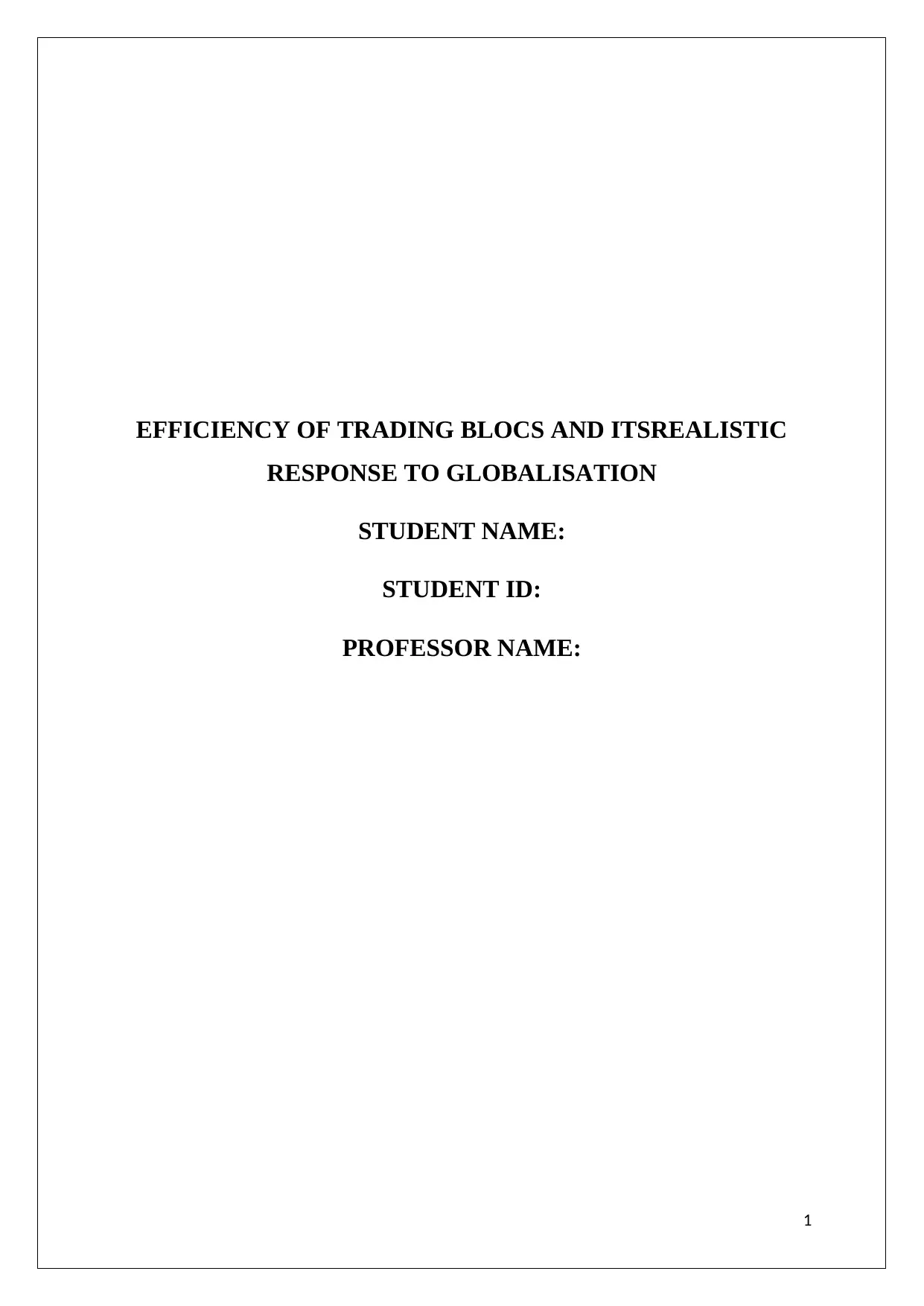
EFFICIENCY OF TRADING BLOCS AND ITSREALISTIC
RESPONSE TO GLOBALISATION
STUDENT NAME:
STUDENT ID:
PROFESSOR NAME:
1
RESPONSE TO GLOBALISATION
STUDENT NAME:
STUDENT ID:
PROFESSOR NAME:
1
Paraphrase This Document
Need a fresh take? Get an instant paraphrase of this document with our AI Paraphraser
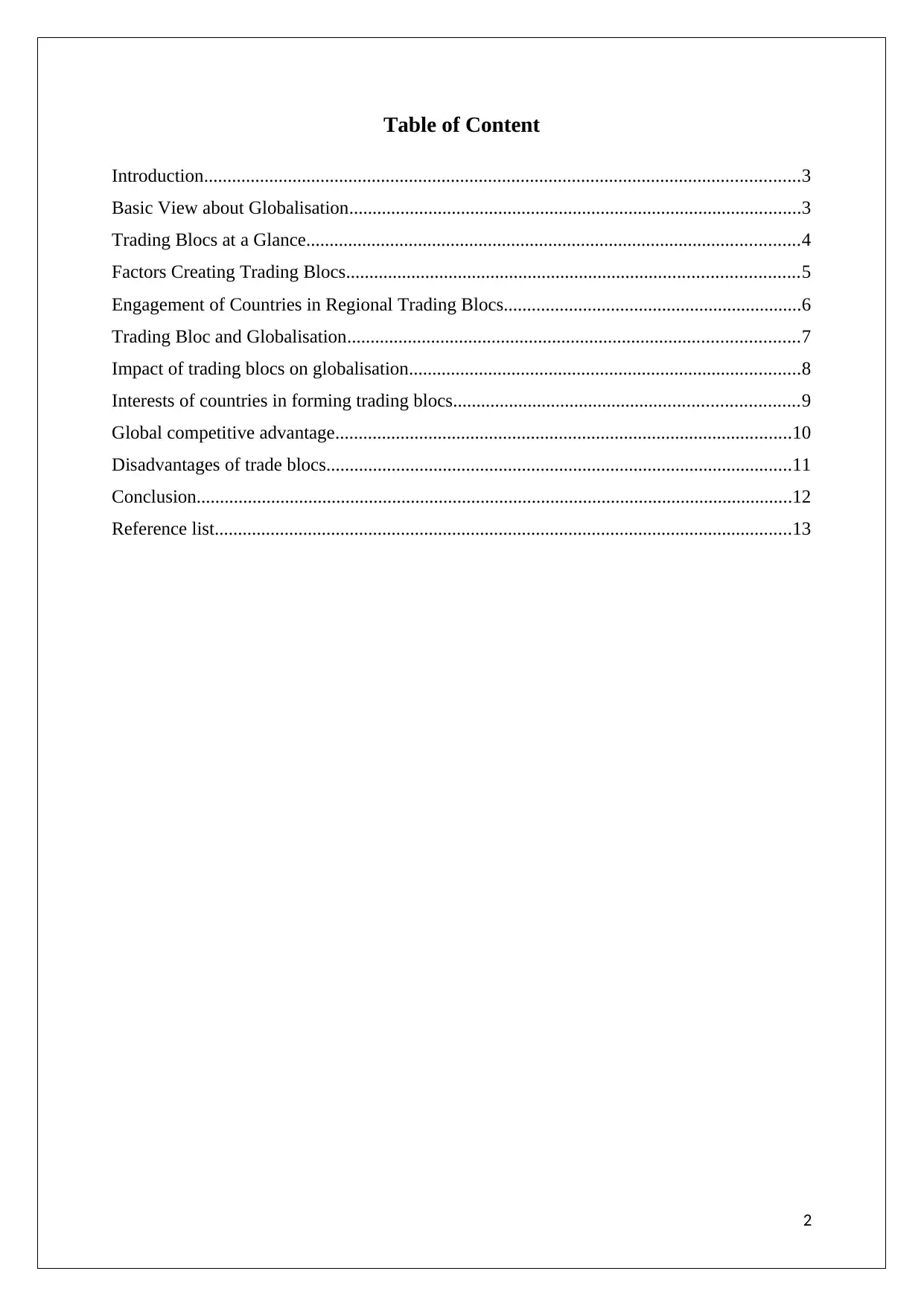
Table of Content
Introduction................................................................................................................................3
Basic View about Globalisation.................................................................................................3
Trading Blocs at a Glance..........................................................................................................4
Factors Creating Trading Blocs.................................................................................................5
Engagement of Countries in Regional Trading Blocs................................................................6
Trading Bloc and Globalisation.................................................................................................7
Impact of trading blocs on globalisation....................................................................................8
Interests of countries in forming trading blocs..........................................................................9
Global competitive advantage..................................................................................................10
Disadvantages of trade blocs....................................................................................................11
Conclusion................................................................................................................................12
Reference list............................................................................................................................13
2
Introduction................................................................................................................................3
Basic View about Globalisation.................................................................................................3
Trading Blocs at a Glance..........................................................................................................4
Factors Creating Trading Blocs.................................................................................................5
Engagement of Countries in Regional Trading Blocs................................................................6
Trading Bloc and Globalisation.................................................................................................7
Impact of trading blocs on globalisation....................................................................................8
Interests of countries in forming trading blocs..........................................................................9
Global competitive advantage..................................................................................................10
Disadvantages of trade blocs....................................................................................................11
Conclusion................................................................................................................................12
Reference list............................................................................................................................13
2
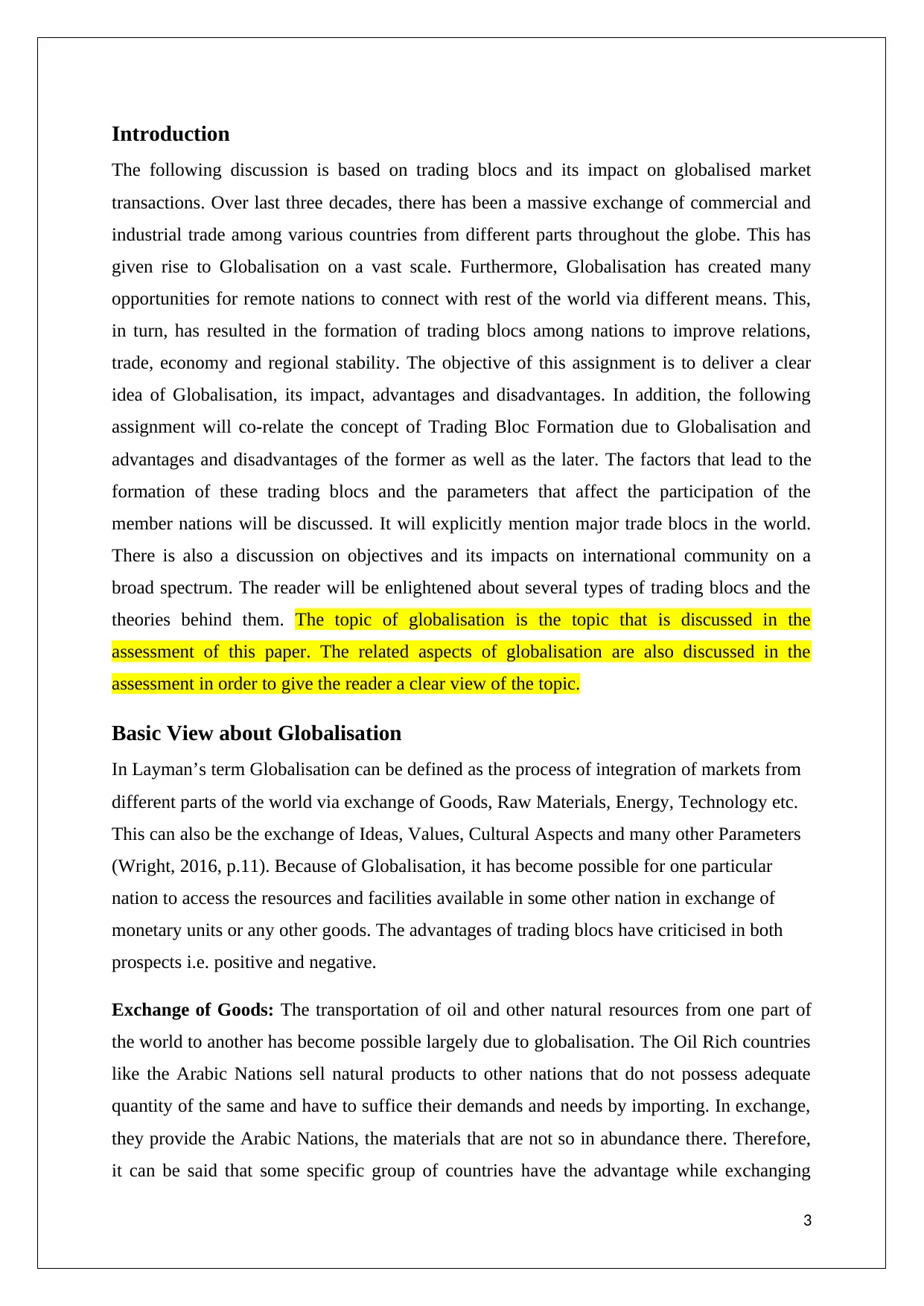
Introduction
The following discussion is based on trading blocs and its impact on globalised market
transactions. Over last three decades, there has been a massive exchange of commercial and
industrial trade among various countries from different parts throughout the globe. This has
given rise to Globalisation on a vast scale. Furthermore, Globalisation has created many
opportunities for remote nations to connect with rest of the world via different means. This,
in turn, has resulted in the formation of trading blocs among nations to improve relations,
trade, economy and regional stability. The objective of this assignment is to deliver a clear
idea of Globalisation, its impact, advantages and disadvantages. In addition, the following
assignment will co-relate the concept of Trading Bloc Formation due to Globalisation and
advantages and disadvantages of the former as well as the later. The factors that lead to the
formation of these trading blocs and the parameters that affect the participation of the
member nations will be discussed. It will explicitly mention major trade blocs in the world.
There is also a discussion on objectives and its impacts on international community on a
broad spectrum. The reader will be enlightened about several types of trading blocs and the
theories behind them. The topic of globalisation is the topic that is discussed in the
assessment of this paper. The related aspects of globalisation are also discussed in the
assessment in order to give the reader a clear view of the topic.
Basic View about Globalisation
In Layman’s term Globalisation can be defined as the process of integration of markets from
different parts of the world via exchange of Goods, Raw Materials, Energy, Technology etc.
This can also be the exchange of Ideas, Values, Cultural Aspects and many other Parameters
(Wright, 2016, p.11). Because of Globalisation, it has become possible for one particular
nation to access the resources and facilities available in some other nation in exchange of
monetary units or any other goods. The advantages of trading blocs have criticised in both
prospects i.e. positive and negative.
Exchange of Goods: The transportation of oil and other natural resources from one part of
the world to another has become possible largely due to globalisation. The Oil Rich countries
like the Arabic Nations sell natural products to other nations that do not possess adequate
quantity of the same and have to suffice their demands and needs by importing. In exchange,
they provide the Arabic Nations, the materials that are not so in abundance there. Therefore,
it can be said that some specific group of countries have the advantage while exchanging
3
The following discussion is based on trading blocs and its impact on globalised market
transactions. Over last three decades, there has been a massive exchange of commercial and
industrial trade among various countries from different parts throughout the globe. This has
given rise to Globalisation on a vast scale. Furthermore, Globalisation has created many
opportunities for remote nations to connect with rest of the world via different means. This,
in turn, has resulted in the formation of trading blocs among nations to improve relations,
trade, economy and regional stability. The objective of this assignment is to deliver a clear
idea of Globalisation, its impact, advantages and disadvantages. In addition, the following
assignment will co-relate the concept of Trading Bloc Formation due to Globalisation and
advantages and disadvantages of the former as well as the later. The factors that lead to the
formation of these trading blocs and the parameters that affect the participation of the
member nations will be discussed. It will explicitly mention major trade blocs in the world.
There is also a discussion on objectives and its impacts on international community on a
broad spectrum. The reader will be enlightened about several types of trading blocs and the
theories behind them. The topic of globalisation is the topic that is discussed in the
assessment of this paper. The related aspects of globalisation are also discussed in the
assessment in order to give the reader a clear view of the topic.
Basic View about Globalisation
In Layman’s term Globalisation can be defined as the process of integration of markets from
different parts of the world via exchange of Goods, Raw Materials, Energy, Technology etc.
This can also be the exchange of Ideas, Values, Cultural Aspects and many other Parameters
(Wright, 2016, p.11). Because of Globalisation, it has become possible for one particular
nation to access the resources and facilities available in some other nation in exchange of
monetary units or any other goods. The advantages of trading blocs have criticised in both
prospects i.e. positive and negative.
Exchange of Goods: The transportation of oil and other natural resources from one part of
the world to another has become possible largely due to globalisation. The Oil Rich countries
like the Arabic Nations sell natural products to other nations that do not possess adequate
quantity of the same and have to suffice their demands and needs by importing. In exchange,
they provide the Arabic Nations, the materials that are not so in abundance there. Therefore,
it can be said that some specific group of countries have the advantage while exchanging
3
⊘ This is a preview!⊘
Do you want full access?
Subscribe today to unlock all pages.

Trusted by 1+ million students worldwide
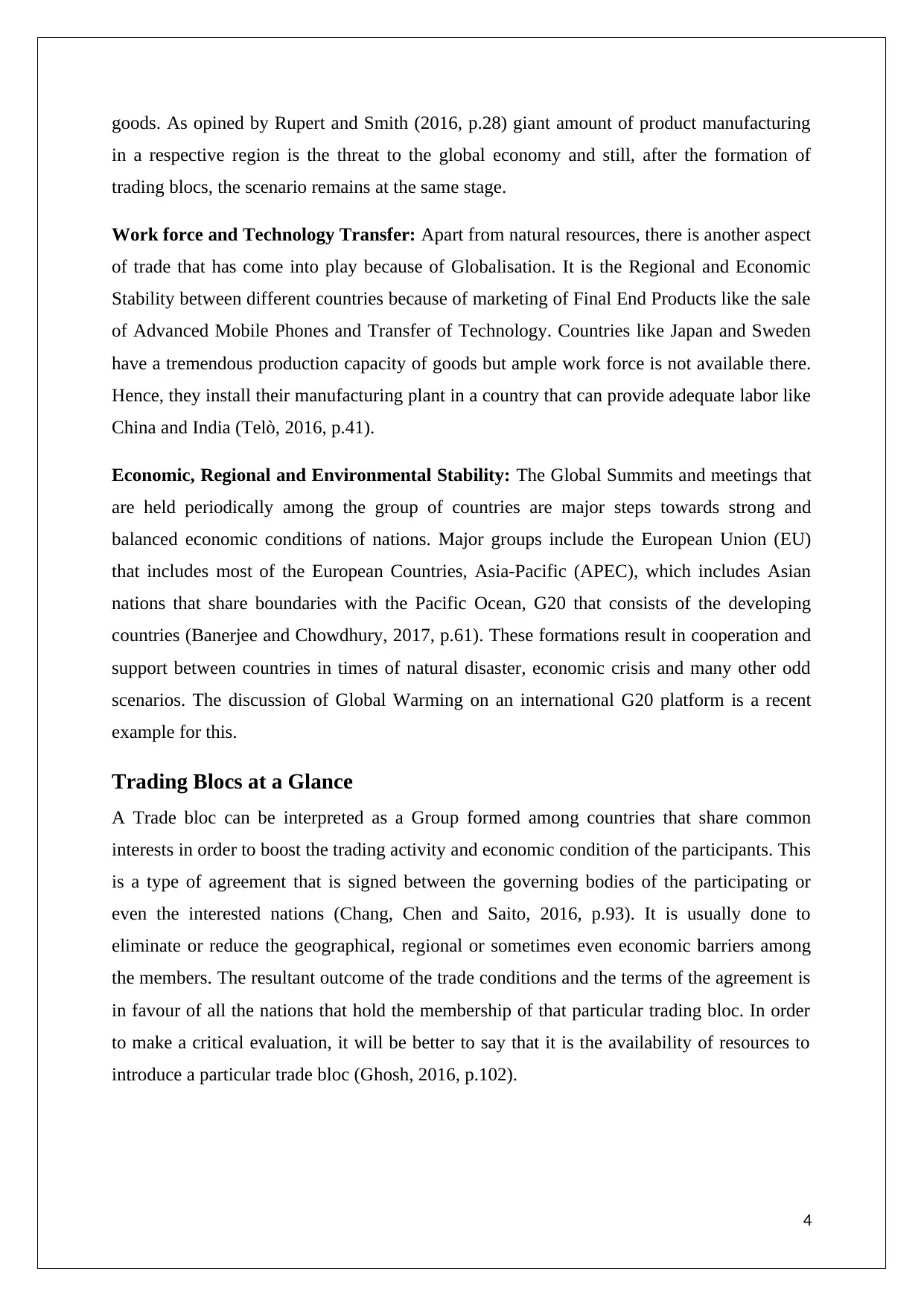
goods. As opined by Rupert and Smith (2016, p.28) giant amount of product manufacturing
in a respective region is the threat to the global economy and still, after the formation of
trading blocs, the scenario remains at the same stage.
Work force and Technology Transfer: Apart from natural resources, there is another aspect
of trade that has come into play because of Globalisation. It is the Regional and Economic
Stability between different countries because of marketing of Final End Products like the sale
of Advanced Mobile Phones and Transfer of Technology. Countries like Japan and Sweden
have a tremendous production capacity of goods but ample work force is not available there.
Hence, they install their manufacturing plant in a country that can provide adequate labor like
China and India (Telò, 2016, p.41).
Economic, Regional and Environmental Stability: The Global Summits and meetings that
are held periodically among the group of countries are major steps towards strong and
balanced economic conditions of nations. Major groups include the European Union (EU)
that includes most of the European Countries, Asia-Pacific (APEC), which includes Asian
nations that share boundaries with the Pacific Ocean, G20 that consists of the developing
countries (Banerjee and Chowdhury, 2017, p.61). These formations result in cooperation and
support between countries in times of natural disaster, economic crisis and many other odd
scenarios. The discussion of Global Warming on an international G20 platform is a recent
example for this.
Trading Blocs at a Glance
A Trade bloc can be interpreted as a Group formed among countries that share common
interests in order to boost the trading activity and economic condition of the participants. This
is a type of agreement that is signed between the governing bodies of the participating or
even the interested nations (Chang, Chen and Saito, 2016, p.93). It is usually done to
eliminate or reduce the geographical, regional or sometimes even economic barriers among
the members. The resultant outcome of the trade conditions and the terms of the agreement is
in favour of all the nations that hold the membership of that particular trading bloc. In order
to make a critical evaluation, it will be better to say that it is the availability of resources to
introduce a particular trade bloc (Ghosh, 2016, p.102).
4
in a respective region is the threat to the global economy and still, after the formation of
trading blocs, the scenario remains at the same stage.
Work force and Technology Transfer: Apart from natural resources, there is another aspect
of trade that has come into play because of Globalisation. It is the Regional and Economic
Stability between different countries because of marketing of Final End Products like the sale
of Advanced Mobile Phones and Transfer of Technology. Countries like Japan and Sweden
have a tremendous production capacity of goods but ample work force is not available there.
Hence, they install their manufacturing plant in a country that can provide adequate labor like
China and India (Telò, 2016, p.41).
Economic, Regional and Environmental Stability: The Global Summits and meetings that
are held periodically among the group of countries are major steps towards strong and
balanced economic conditions of nations. Major groups include the European Union (EU)
that includes most of the European Countries, Asia-Pacific (APEC), which includes Asian
nations that share boundaries with the Pacific Ocean, G20 that consists of the developing
countries (Banerjee and Chowdhury, 2017, p.61). These formations result in cooperation and
support between countries in times of natural disaster, economic crisis and many other odd
scenarios. The discussion of Global Warming on an international G20 platform is a recent
example for this.
Trading Blocs at a Glance
A Trade bloc can be interpreted as a Group formed among countries that share common
interests in order to boost the trading activity and economic condition of the participants. This
is a type of agreement that is signed between the governing bodies of the participating or
even the interested nations (Chang, Chen and Saito, 2016, p.93). It is usually done to
eliminate or reduce the geographical, regional or sometimes even economic barriers among
the members. The resultant outcome of the trade conditions and the terms of the agreement is
in favour of all the nations that hold the membership of that particular trading bloc. In order
to make a critical evaluation, it will be better to say that it is the availability of resources to
introduce a particular trade bloc (Ghosh, 2016, p.102).
4
Paraphrase This Document
Need a fresh take? Get an instant paraphrase of this document with our AI Paraphraser
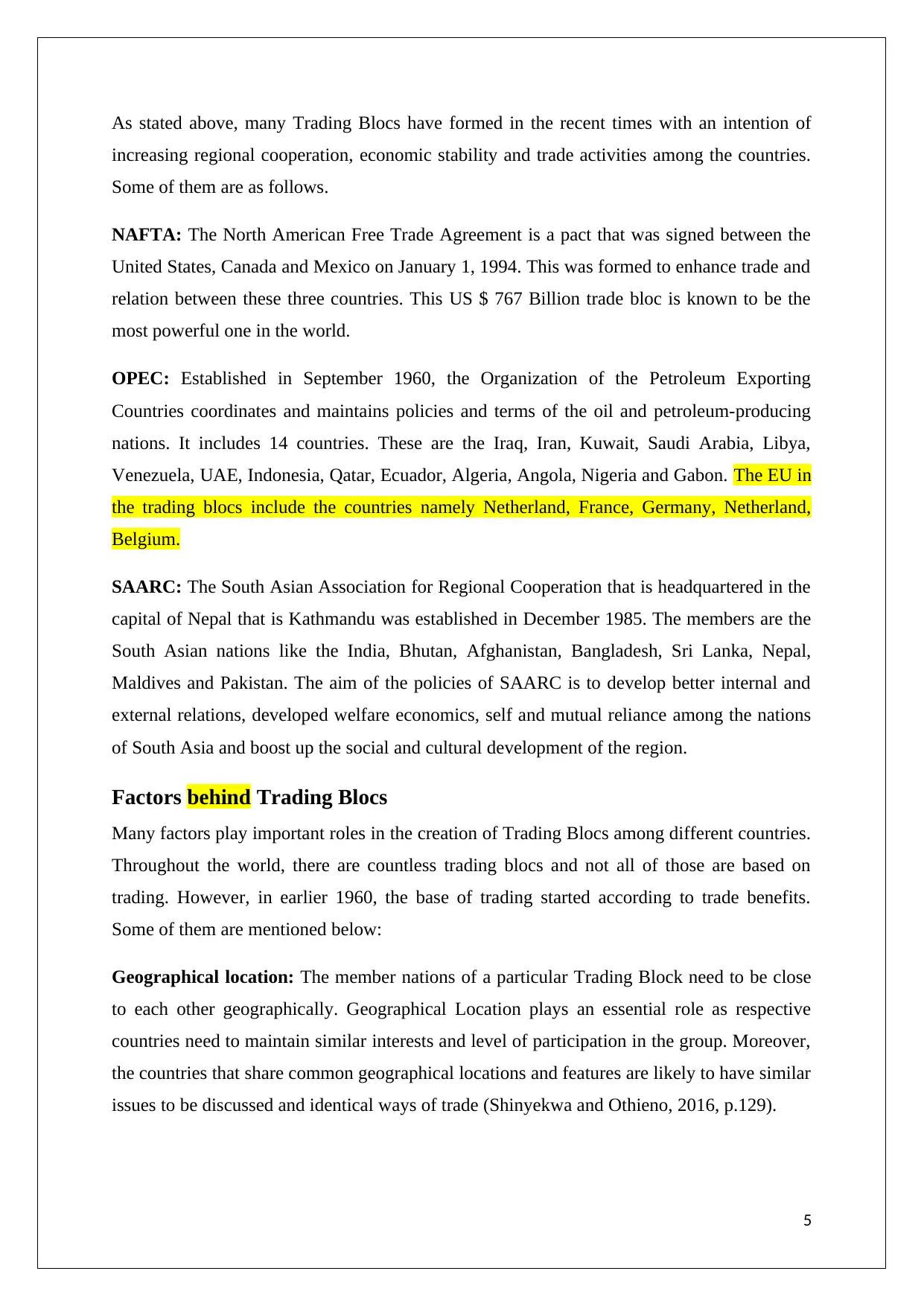
As stated above, many Trading Blocs have formed in the recent times with an intention of
increasing regional cooperation, economic stability and trade activities among the countries.
Some of them are as follows.
NAFTA: The North American Free Trade Agreement is a pact that was signed between the
United States, Canada and Mexico on January 1, 1994. This was formed to enhance trade and
relation between these three countries. This US $ 767 Billion trade bloc is known to be the
most powerful one in the world.
OPEC: Established in September 1960, the Organization of the Petroleum Exporting
Countries coordinates and maintains policies and terms of the oil and petroleum-producing
nations. It includes 14 countries. These are the Iraq, Iran, Kuwait, Saudi Arabia, Libya,
Venezuela, UAE, Indonesia, Qatar, Ecuador, Algeria, Angola, Nigeria and Gabon. The EU in
the trading blocs include the countries namely Netherland, France, Germany, Netherland,
Belgium.
SAARC: The South Asian Association for Regional Cooperation that is headquartered in the
capital of Nepal that is Kathmandu was established in December 1985. The members are the
South Asian nations like the India, Bhutan, Afghanistan, Bangladesh, Sri Lanka, Nepal,
Maldives and Pakistan. The aim of the policies of SAARC is to develop better internal and
external relations, developed welfare economics, self and mutual reliance among the nations
of South Asia and boost up the social and cultural development of the region.
Factors behind Trading Blocs
Many factors play important roles in the creation of Trading Blocs among different countries.
Throughout the world, there are countless trading blocs and not all of those are based on
trading. However, in earlier 1960, the base of trading started according to trade benefits.
Some of them are mentioned below:
Geographical location: The member nations of a particular Trading Block need to be close
to each other geographically. Geographical Location plays an essential role as respective
countries need to maintain similar interests and level of participation in the group. Moreover,
the countries that share common geographical locations and features are likely to have similar
issues to be discussed and identical ways of trade (Shinyekwa and Othieno, 2016, p.129).
5
increasing regional cooperation, economic stability and trade activities among the countries.
Some of them are as follows.
NAFTA: The North American Free Trade Agreement is a pact that was signed between the
United States, Canada and Mexico on January 1, 1994. This was formed to enhance trade and
relation between these three countries. This US $ 767 Billion trade bloc is known to be the
most powerful one in the world.
OPEC: Established in September 1960, the Organization of the Petroleum Exporting
Countries coordinates and maintains policies and terms of the oil and petroleum-producing
nations. It includes 14 countries. These are the Iraq, Iran, Kuwait, Saudi Arabia, Libya,
Venezuela, UAE, Indonesia, Qatar, Ecuador, Algeria, Angola, Nigeria and Gabon. The EU in
the trading blocs include the countries namely Netherland, France, Germany, Netherland,
Belgium.
SAARC: The South Asian Association for Regional Cooperation that is headquartered in the
capital of Nepal that is Kathmandu was established in December 1985. The members are the
South Asian nations like the India, Bhutan, Afghanistan, Bangladesh, Sri Lanka, Nepal,
Maldives and Pakistan. The aim of the policies of SAARC is to develop better internal and
external relations, developed welfare economics, self and mutual reliance among the nations
of South Asia and boost up the social and cultural development of the region.
Factors behind Trading Blocs
Many factors play important roles in the creation of Trading Blocs among different countries.
Throughout the world, there are countless trading blocs and not all of those are based on
trading. However, in earlier 1960, the base of trading started according to trade benefits.
Some of them are mentioned below:
Geographical location: The member nations of a particular Trading Block need to be close
to each other geographically. Geographical Location plays an essential role as respective
countries need to maintain similar interests and level of participation in the group. Moreover,
the countries that share common geographical locations and features are likely to have similar
issues to be discussed and identical ways of trade (Shinyekwa and Othieno, 2016, p.129).
5
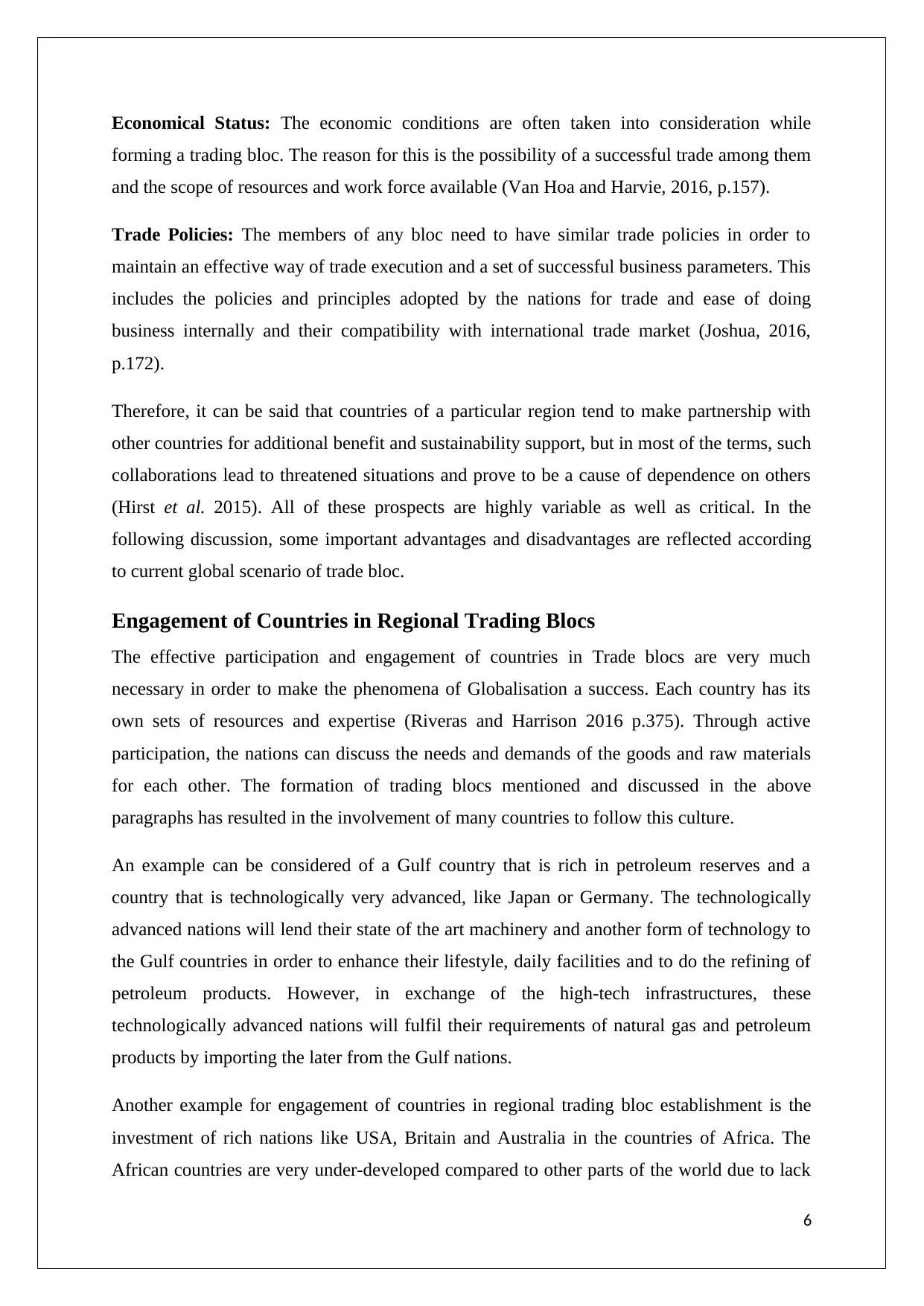
Economical Status: The economic conditions are often taken into consideration while
forming a trading bloc. The reason for this is the possibility of a successful trade among them
and the scope of resources and work force available (Van Hoa and Harvie, 2016, p.157).
Trade Policies: The members of any bloc need to have similar trade policies in order to
maintain an effective way of trade execution and a set of successful business parameters. This
includes the policies and principles adopted by the nations for trade and ease of doing
business internally and their compatibility with international trade market (Joshua, 2016,
p.172).
Therefore, it can be said that countries of a particular region tend to make partnership with
other countries for additional benefit and sustainability support, but in most of the terms, such
collaborations lead to threatened situations and prove to be a cause of dependence on others
(Hirst et al. 2015). All of these prospects are highly variable as well as critical. In the
following discussion, some important advantages and disadvantages are reflected according
to current global scenario of trade bloc.
Engagement of Countries in Regional Trading Blocs
The effective participation and engagement of countries in Trade blocs are very much
necessary in order to make the phenomena of Globalisation a success. Each country has its
own sets of resources and expertise (Riveras and Harrison 2016 p.375). Through active
participation, the nations can discuss the needs and demands of the goods and raw materials
for each other. The formation of trading blocs mentioned and discussed in the above
paragraphs has resulted in the involvement of many countries to follow this culture.
An example can be considered of a Gulf country that is rich in petroleum reserves and a
country that is technologically very advanced, like Japan or Germany. The technologically
advanced nations will lend their state of the art machinery and another form of technology to
the Gulf countries in order to enhance their lifestyle, daily facilities and to do the refining of
petroleum products. However, in exchange of the high-tech infrastructures, these
technologically advanced nations will fulfil their requirements of natural gas and petroleum
products by importing the later from the Gulf nations.
Another example for engagement of countries in regional trading bloc establishment is the
investment of rich nations like USA, Britain and Australia in the countries of Africa. The
African countries are very under-developed compared to other parts of the world due to lack
6
forming a trading bloc. The reason for this is the possibility of a successful trade among them
and the scope of resources and work force available (Van Hoa and Harvie, 2016, p.157).
Trade Policies: The members of any bloc need to have similar trade policies in order to
maintain an effective way of trade execution and a set of successful business parameters. This
includes the policies and principles adopted by the nations for trade and ease of doing
business internally and their compatibility with international trade market (Joshua, 2016,
p.172).
Therefore, it can be said that countries of a particular region tend to make partnership with
other countries for additional benefit and sustainability support, but in most of the terms, such
collaborations lead to threatened situations and prove to be a cause of dependence on others
(Hirst et al. 2015). All of these prospects are highly variable as well as critical. In the
following discussion, some important advantages and disadvantages are reflected according
to current global scenario of trade bloc.
Engagement of Countries in Regional Trading Blocs
The effective participation and engagement of countries in Trade blocs are very much
necessary in order to make the phenomena of Globalisation a success. Each country has its
own sets of resources and expertise (Riveras and Harrison 2016 p.375). Through active
participation, the nations can discuss the needs and demands of the goods and raw materials
for each other. The formation of trading blocs mentioned and discussed in the above
paragraphs has resulted in the involvement of many countries to follow this culture.
An example can be considered of a Gulf country that is rich in petroleum reserves and a
country that is technologically very advanced, like Japan or Germany. The technologically
advanced nations will lend their state of the art machinery and another form of technology to
the Gulf countries in order to enhance their lifestyle, daily facilities and to do the refining of
petroleum products. However, in exchange of the high-tech infrastructures, these
technologically advanced nations will fulfil their requirements of natural gas and petroleum
products by importing the later from the Gulf nations.
Another example for engagement of countries in regional trading bloc establishment is the
investment of rich nations like USA, Britain and Australia in the countries of Africa. The
African countries are very under-developed compared to other parts of the world due to lack
6
⊘ This is a preview!⊘
Do you want full access?
Subscribe today to unlock all pages.

Trusted by 1+ million students worldwide
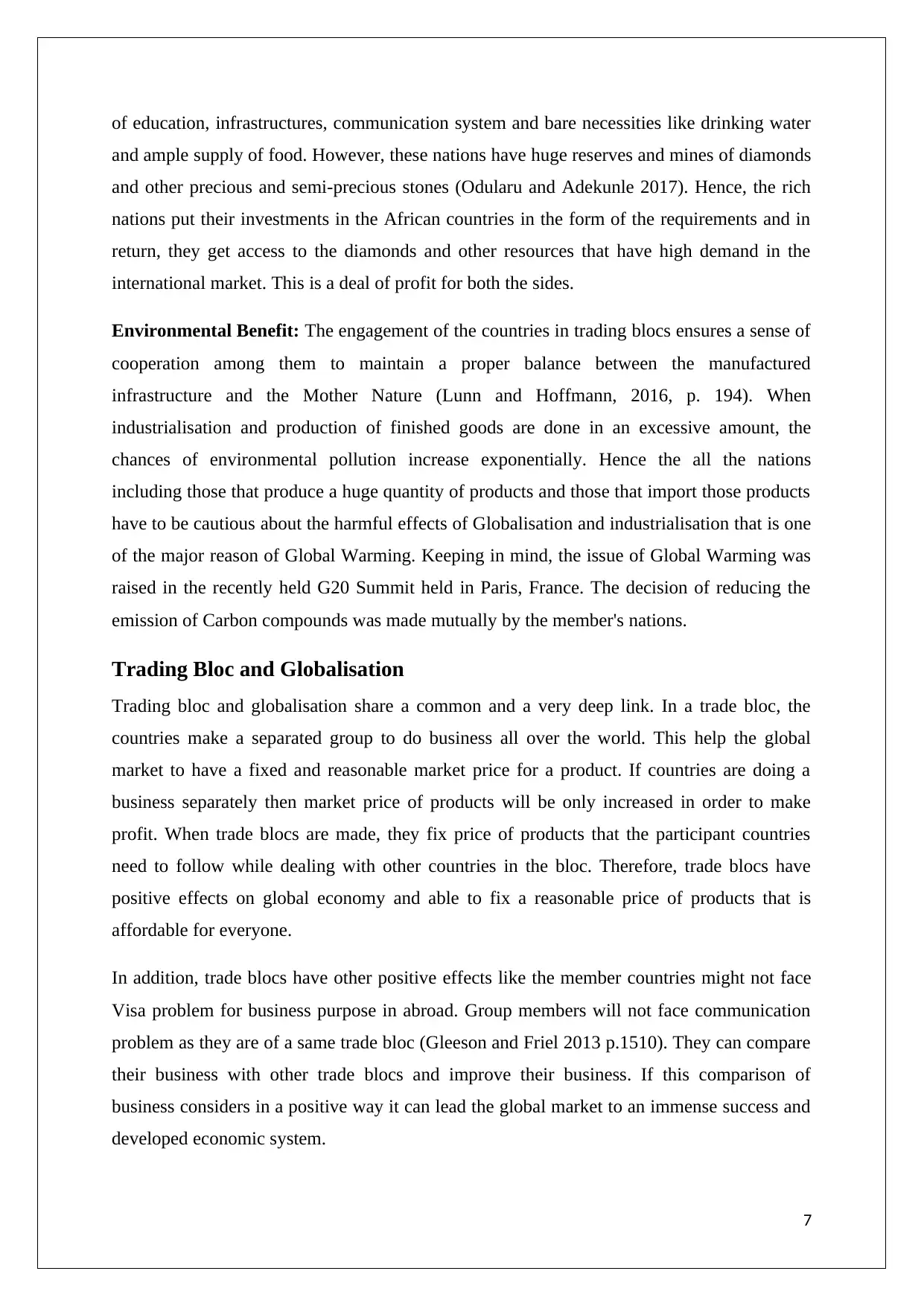
of education, infrastructures, communication system and bare necessities like drinking water
and ample supply of food. However, these nations have huge reserves and mines of diamonds
and other precious and semi-precious stones (Odularu and Adekunle 2017). Hence, the rich
nations put their investments in the African countries in the form of the requirements and in
return, they get access to the diamonds and other resources that have high demand in the
international market. This is a deal of profit for both the sides.
Environmental Benefit: The engagement of the countries in trading blocs ensures a sense of
cooperation among them to maintain a proper balance between the manufactured
infrastructure and the Mother Nature (Lunn and Hoffmann, 2016, p. 194). When
industrialisation and production of finished goods are done in an excessive amount, the
chances of environmental pollution increase exponentially. Hence the all the nations
including those that produce a huge quantity of products and those that import those products
have to be cautious about the harmful effects of Globalisation and industrialisation that is one
of the major reason of Global Warming. Keeping in mind, the issue of Global Warming was
raised in the recently held G20 Summit held in Paris, France. The decision of reducing the
emission of Carbon compounds was made mutually by the member's nations.
Trading Bloc and Globalisation
Trading bloc and globalisation share a common and a very deep link. In a trade bloc, the
countries make a separated group to do business all over the world. This help the global
market to have a fixed and reasonable market price for a product. If countries are doing a
business separately then market price of products will be only increased in order to make
profit. When trade blocs are made, they fix price of products that the participant countries
need to follow while dealing with other countries in the bloc. Therefore, trade blocs have
positive effects on global economy and able to fix a reasonable price of products that is
affordable for everyone.
In addition, trade blocs have other positive effects like the member countries might not face
Visa problem for business purpose in abroad. Group members will not face communication
problem as they are of a same trade bloc (Gleeson and Friel 2013 p.1510). They can compare
their business with other trade blocs and improve their business. If this comparison of
business considers in a positive way it can lead the global market to an immense success and
developed economic system.
7
and ample supply of food. However, these nations have huge reserves and mines of diamonds
and other precious and semi-precious stones (Odularu and Adekunle 2017). Hence, the rich
nations put their investments in the African countries in the form of the requirements and in
return, they get access to the diamonds and other resources that have high demand in the
international market. This is a deal of profit for both the sides.
Environmental Benefit: The engagement of the countries in trading blocs ensures a sense of
cooperation among them to maintain a proper balance between the manufactured
infrastructure and the Mother Nature (Lunn and Hoffmann, 2016, p. 194). When
industrialisation and production of finished goods are done in an excessive amount, the
chances of environmental pollution increase exponentially. Hence the all the nations
including those that produce a huge quantity of products and those that import those products
have to be cautious about the harmful effects of Globalisation and industrialisation that is one
of the major reason of Global Warming. Keeping in mind, the issue of Global Warming was
raised in the recently held G20 Summit held in Paris, France. The decision of reducing the
emission of Carbon compounds was made mutually by the member's nations.
Trading Bloc and Globalisation
Trading bloc and globalisation share a common and a very deep link. In a trade bloc, the
countries make a separated group to do business all over the world. This help the global
market to have a fixed and reasonable market price for a product. If countries are doing a
business separately then market price of products will be only increased in order to make
profit. When trade blocs are made, they fix price of products that the participant countries
need to follow while dealing with other countries in the bloc. Therefore, trade blocs have
positive effects on global economy and able to fix a reasonable price of products that is
affordable for everyone.
In addition, trade blocs have other positive effects like the member countries might not face
Visa problem for business purpose in abroad. Group members will not face communication
problem as they are of a same trade bloc (Gleeson and Friel 2013 p.1510). They can compare
their business with other trade blocs and improve their business. If this comparison of
business considers in a positive way it can lead the global market to an immense success and
developed economic system.
7
Paraphrase This Document
Need a fresh take? Get an instant paraphrase of this document with our AI Paraphraser
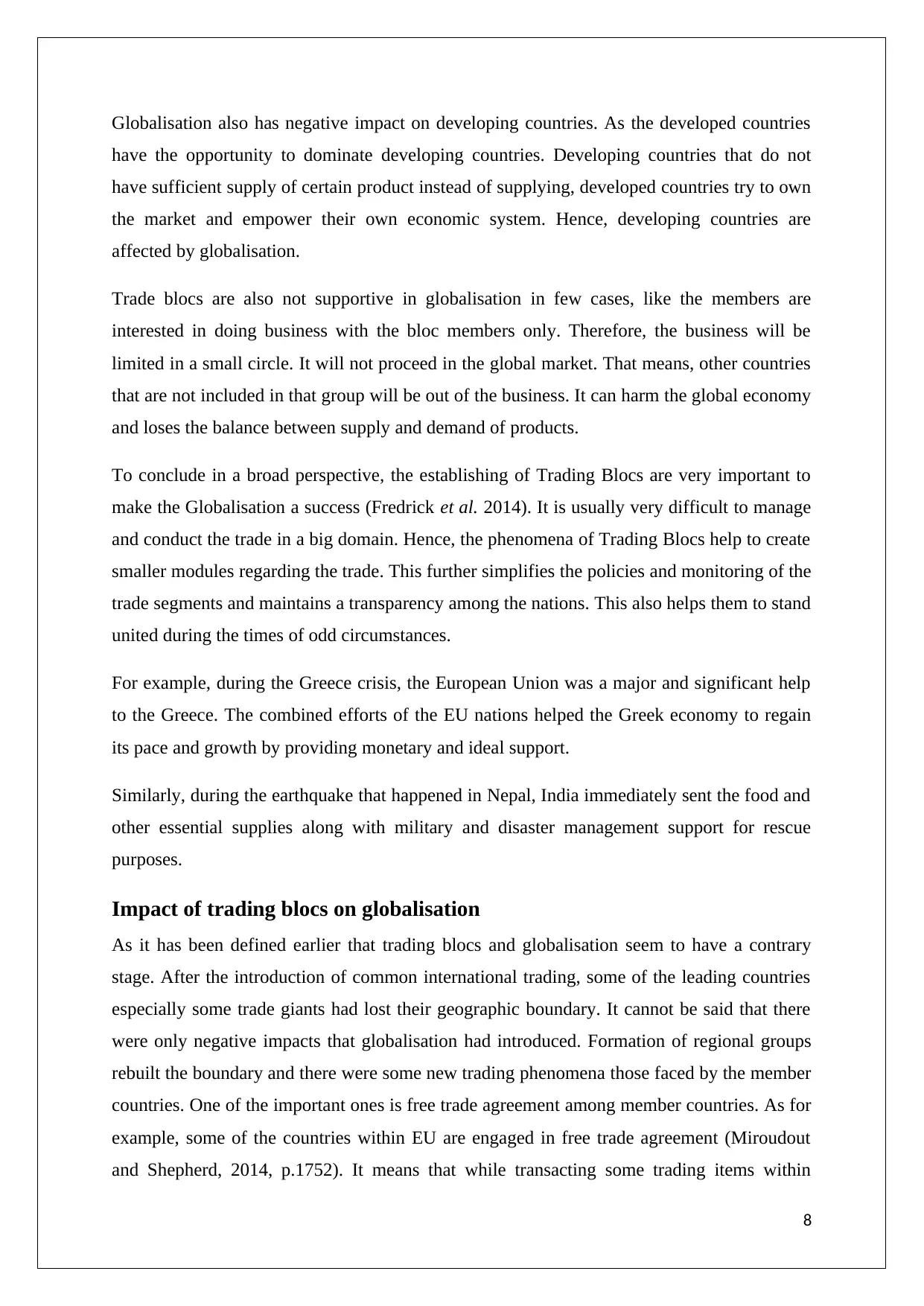
Globalisation also has negative impact on developing countries. As the developed countries
have the opportunity to dominate developing countries. Developing countries that do not
have sufficient supply of certain product instead of supplying, developed countries try to own
the market and empower their own economic system. Hence, developing countries are
affected by globalisation.
Trade blocs are also not supportive in globalisation in few cases, like the members are
interested in doing business with the bloc members only. Therefore, the business will be
limited in a small circle. It will not proceed in the global market. That means, other countries
that are not included in that group will be out of the business. It can harm the global economy
and loses the balance between supply and demand of products.
To conclude in a broad perspective, the establishing of Trading Blocs are very important to
make the Globalisation a success (Fredrick et al. 2014). It is usually very difficult to manage
and conduct the trade in a big domain. Hence, the phenomena of Trading Blocs help to create
smaller modules regarding the trade. This further simplifies the policies and monitoring of the
trade segments and maintains a transparency among the nations. This also helps them to stand
united during the times of odd circumstances.
For example, during the Greece crisis, the European Union was a major and significant help
to the Greece. The combined efforts of the EU nations helped the Greek economy to regain
its pace and growth by providing monetary and ideal support.
Similarly, during the earthquake that happened in Nepal, India immediately sent the food and
other essential supplies along with military and disaster management support for rescue
purposes.
Impact of trading blocs on globalisation
As it has been defined earlier that trading blocs and globalisation seem to have a contrary
stage. After the introduction of common international trading, some of the leading countries
especially some trade giants had lost their geographic boundary. It cannot be said that there
were only negative impacts that globalisation had introduced. Formation of regional groups
rebuilt the boundary and there were some new trading phenomena those faced by the member
countries. One of the important ones is free trade agreement among member countries. As for
example, some of the countries within EU are engaged in free trade agreement (Miroudout
and Shepherd, 2014, p.1752). It means that while transacting some trading items within
8
have the opportunity to dominate developing countries. Developing countries that do not
have sufficient supply of certain product instead of supplying, developed countries try to own
the market and empower their own economic system. Hence, developing countries are
affected by globalisation.
Trade blocs are also not supportive in globalisation in few cases, like the members are
interested in doing business with the bloc members only. Therefore, the business will be
limited in a small circle. It will not proceed in the global market. That means, other countries
that are not included in that group will be out of the business. It can harm the global economy
and loses the balance between supply and demand of products.
To conclude in a broad perspective, the establishing of Trading Blocs are very important to
make the Globalisation a success (Fredrick et al. 2014). It is usually very difficult to manage
and conduct the trade in a big domain. Hence, the phenomena of Trading Blocs help to create
smaller modules regarding the trade. This further simplifies the policies and monitoring of the
trade segments and maintains a transparency among the nations. This also helps them to stand
united during the times of odd circumstances.
For example, during the Greece crisis, the European Union was a major and significant help
to the Greece. The combined efforts of the EU nations helped the Greek economy to regain
its pace and growth by providing monetary and ideal support.
Similarly, during the earthquake that happened in Nepal, India immediately sent the food and
other essential supplies along with military and disaster management support for rescue
purposes.
Impact of trading blocs on globalisation
As it has been defined earlier that trading blocs and globalisation seem to have a contrary
stage. After the introduction of common international trading, some of the leading countries
especially some trade giants had lost their geographic boundary. It cannot be said that there
were only negative impacts that globalisation had introduced. Formation of regional groups
rebuilt the boundary and there were some new trading phenomena those faced by the member
countries. One of the important ones is free trade agreement among member countries. As for
example, some of the countries within EU are engaged in free trade agreement (Miroudout
and Shepherd, 2014, p.1752). It means that while transacting some trading items within
8
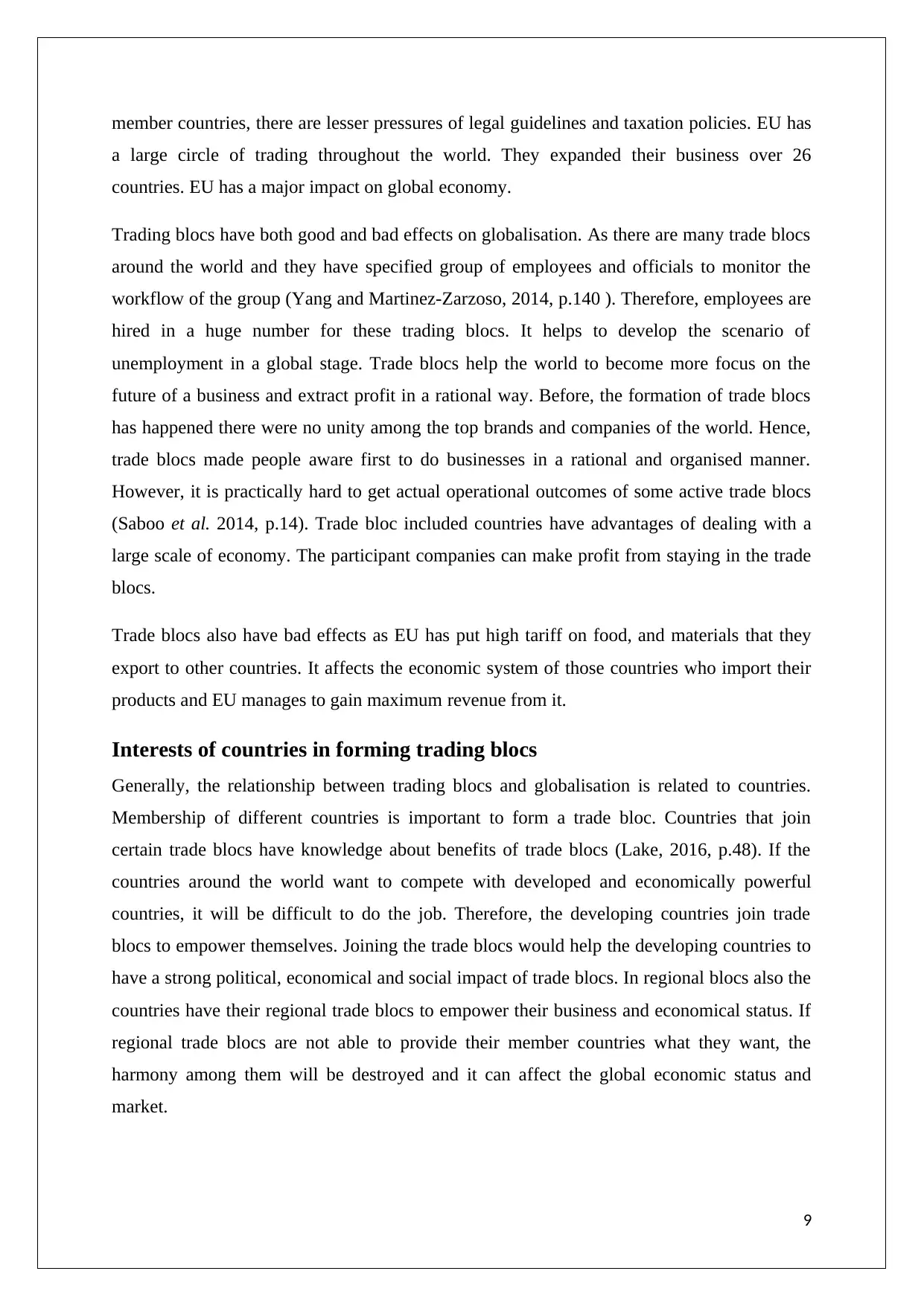
member countries, there are lesser pressures of legal guidelines and taxation policies. EU has
a large circle of trading throughout the world. They expanded their business over 26
countries. EU has a major impact on global economy.
Trading blocs have both good and bad effects on globalisation. As there are many trade blocs
around the world and they have specified group of employees and officials to monitor the
workflow of the group (Yang and Martinez-Zarzoso, 2014, p.140 ). Therefore, employees are
hired in a huge number for these trading blocs. It helps to develop the scenario of
unemployment in a global stage. Trade blocs help the world to become more focus on the
future of a business and extract profit in a rational way. Before, the formation of trade blocs
has happened there were no unity among the top brands and companies of the world. Hence,
trade blocs made people aware first to do businesses in a rational and organised manner.
However, it is practically hard to get actual operational outcomes of some active trade blocs
(Saboo et al. 2014, p.14). Trade bloc included countries have advantages of dealing with a
large scale of economy. The participant companies can make profit from staying in the trade
blocs.
Trade blocs also have bad effects as EU has put high tariff on food, and materials that they
export to other countries. It affects the economic system of those countries who import their
products and EU manages to gain maximum revenue from it.
Interests of countries in forming trading blocs
Generally, the relationship between trading blocs and globalisation is related to countries.
Membership of different countries is important to form a trade bloc. Countries that join
certain trade blocs have knowledge about benefits of trade blocs (Lake, 2016, p.48). If the
countries around the world want to compete with developed and economically powerful
countries, it will be difficult to do the job. Therefore, the developing countries join trade
blocs to empower themselves. Joining the trade blocs would help the developing countries to
have a strong political, economical and social impact of trade blocs. In regional blocs also the
countries have their regional trade blocs to empower their business and economical status. If
regional trade blocs are not able to provide their member countries what they want, the
harmony among them will be destroyed and it can affect the global economic status and
market.
9
a large circle of trading throughout the world. They expanded their business over 26
countries. EU has a major impact on global economy.
Trading blocs have both good and bad effects on globalisation. As there are many trade blocs
around the world and they have specified group of employees and officials to monitor the
workflow of the group (Yang and Martinez-Zarzoso, 2014, p.140 ). Therefore, employees are
hired in a huge number for these trading blocs. It helps to develop the scenario of
unemployment in a global stage. Trade blocs help the world to become more focus on the
future of a business and extract profit in a rational way. Before, the formation of trade blocs
has happened there were no unity among the top brands and companies of the world. Hence,
trade blocs made people aware first to do businesses in a rational and organised manner.
However, it is practically hard to get actual operational outcomes of some active trade blocs
(Saboo et al. 2014, p.14). Trade bloc included countries have advantages of dealing with a
large scale of economy. The participant companies can make profit from staying in the trade
blocs.
Trade blocs also have bad effects as EU has put high tariff on food, and materials that they
export to other countries. It affects the economic system of those countries who import their
products and EU manages to gain maximum revenue from it.
Interests of countries in forming trading blocs
Generally, the relationship between trading blocs and globalisation is related to countries.
Membership of different countries is important to form a trade bloc. Countries that join
certain trade blocs have knowledge about benefits of trade blocs (Lake, 2016, p.48). If the
countries around the world want to compete with developed and economically powerful
countries, it will be difficult to do the job. Therefore, the developing countries join trade
blocs to empower themselves. Joining the trade blocs would help the developing countries to
have a strong political, economical and social impact of trade blocs. In regional blocs also the
countries have their regional trade blocs to empower their business and economical status. If
regional trade blocs are not able to provide their member countries what they want, the
harmony among them will be destroyed and it can affect the global economic status and
market.
9
⊘ This is a preview!⊘
Do you want full access?
Subscribe today to unlock all pages.

Trusted by 1+ million students worldwide
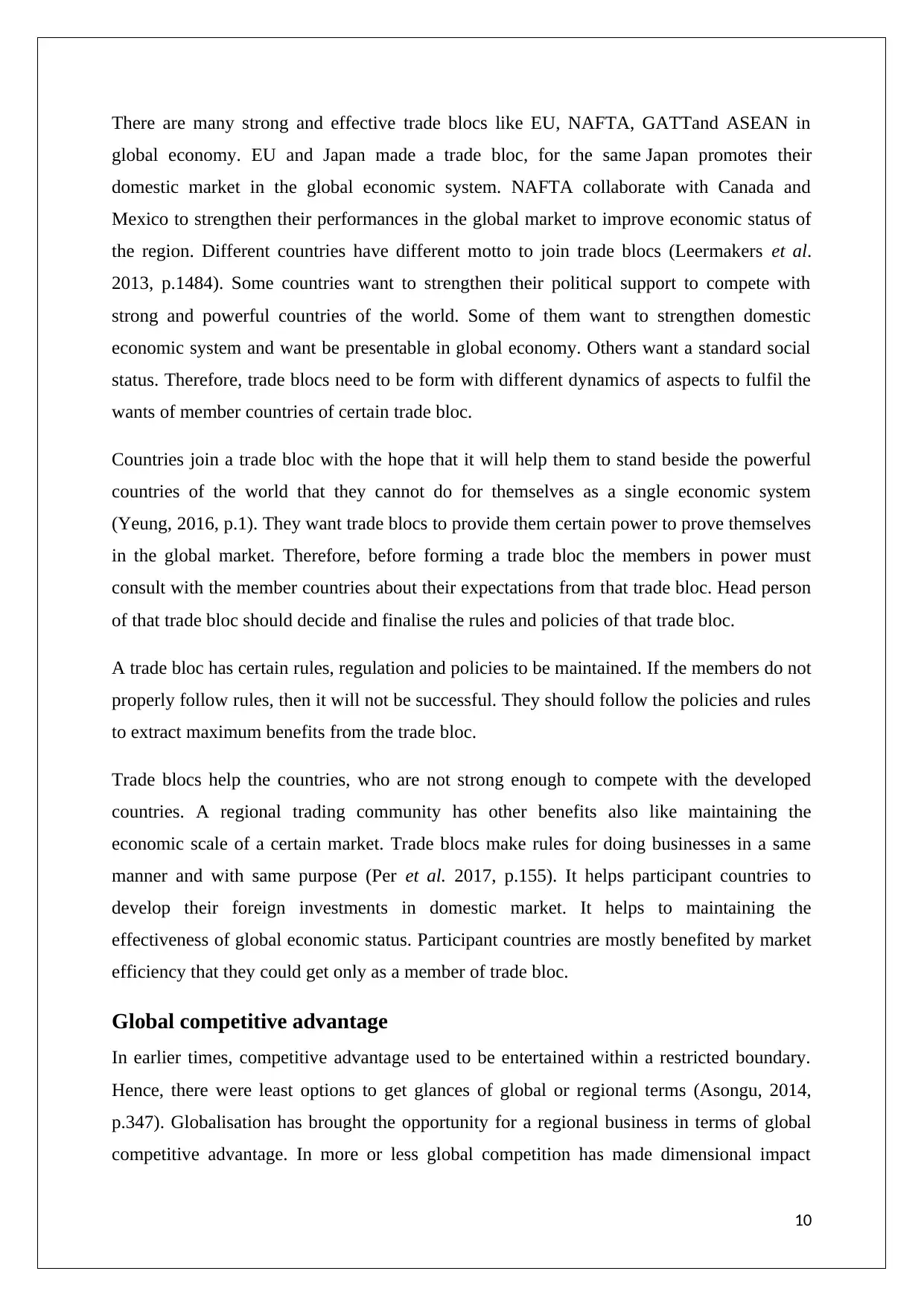
There are many strong and effective trade blocs like EU, NAFTA, GATTand ASEAN in
global economy. EU and Japan made a trade bloc, for the same Japan promotes their
domestic market in the global economic system. NAFTA collaborate with Canada and
Mexico to strengthen their performances in the global market to improve economic status of
the region. Different countries have different motto to join trade blocs (Leermakers et al.
2013, p.1484). Some countries want to strengthen their political support to compete with
strong and powerful countries of the world. Some of them want to strengthen domestic
economic system and want be presentable in global economy. Others want a standard social
status. Therefore, trade blocs need to be form with different dynamics of aspects to fulfil the
wants of member countries of certain trade bloc.
Countries join a trade bloc with the hope that it will help them to stand beside the powerful
countries of the world that they cannot do for themselves as a single economic system
(Yeung, 2016, p.1). They want trade blocs to provide them certain power to prove themselves
in the global market. Therefore, before forming a trade bloc the members in power must
consult with the member countries about their expectations from that trade bloc. Head person
of that trade bloc should decide and finalise the rules and policies of that trade bloc.
A trade bloc has certain rules, regulation and policies to be maintained. If the members do not
properly follow rules, then it will not be successful. They should follow the policies and rules
to extract maximum benefits from the trade bloc.
Trade blocs help the countries, who are not strong enough to compete with the developed
countries. A regional trading community has other benefits also like maintaining the
economic scale of a certain market. Trade blocs make rules for doing businesses in a same
manner and with same purpose (Per et al. 2017, p.155). It helps participant countries to
develop their foreign investments in domestic market. It helps to maintaining the
effectiveness of global economic status. Participant countries are mostly benefited by market
efficiency that they could get only as a member of trade bloc.
Global competitive advantage
In earlier times, competitive advantage used to be entertained within a restricted boundary.
Hence, there were least options to get glances of global or regional terms (Asongu, 2014,
p.347). Globalisation has brought the opportunity for a regional business in terms of global
competitive advantage. In more or less global competition has made dimensional impact
10
global economy. EU and Japan made a trade bloc, for the same Japan promotes their
domestic market in the global economic system. NAFTA collaborate with Canada and
Mexico to strengthen their performances in the global market to improve economic status of
the region. Different countries have different motto to join trade blocs (Leermakers et al.
2013, p.1484). Some countries want to strengthen their political support to compete with
strong and powerful countries of the world. Some of them want to strengthen domestic
economic system and want be presentable in global economy. Others want a standard social
status. Therefore, trade blocs need to be form with different dynamics of aspects to fulfil the
wants of member countries of certain trade bloc.
Countries join a trade bloc with the hope that it will help them to stand beside the powerful
countries of the world that they cannot do for themselves as a single economic system
(Yeung, 2016, p.1). They want trade blocs to provide them certain power to prove themselves
in the global market. Therefore, before forming a trade bloc the members in power must
consult with the member countries about their expectations from that trade bloc. Head person
of that trade bloc should decide and finalise the rules and policies of that trade bloc.
A trade bloc has certain rules, regulation and policies to be maintained. If the members do not
properly follow rules, then it will not be successful. They should follow the policies and rules
to extract maximum benefits from the trade bloc.
Trade blocs help the countries, who are not strong enough to compete with the developed
countries. A regional trading community has other benefits also like maintaining the
economic scale of a certain market. Trade blocs make rules for doing businesses in a same
manner and with same purpose (Per et al. 2017, p.155). It helps participant countries to
develop their foreign investments in domestic market. It helps to maintaining the
effectiveness of global economic status. Participant countries are mostly benefited by market
efficiency that they could get only as a member of trade bloc.
Global competitive advantage
In earlier times, competitive advantage used to be entertained within a restricted boundary.
Hence, there were least options to get glances of global or regional terms (Asongu, 2014,
p.347). Globalisation has brought the opportunity for a regional business in terms of global
competitive advantage. In more or less global competition has made dimensional impact
10
Paraphrase This Document
Need a fresh take? Get an instant paraphrase of this document with our AI Paraphraser
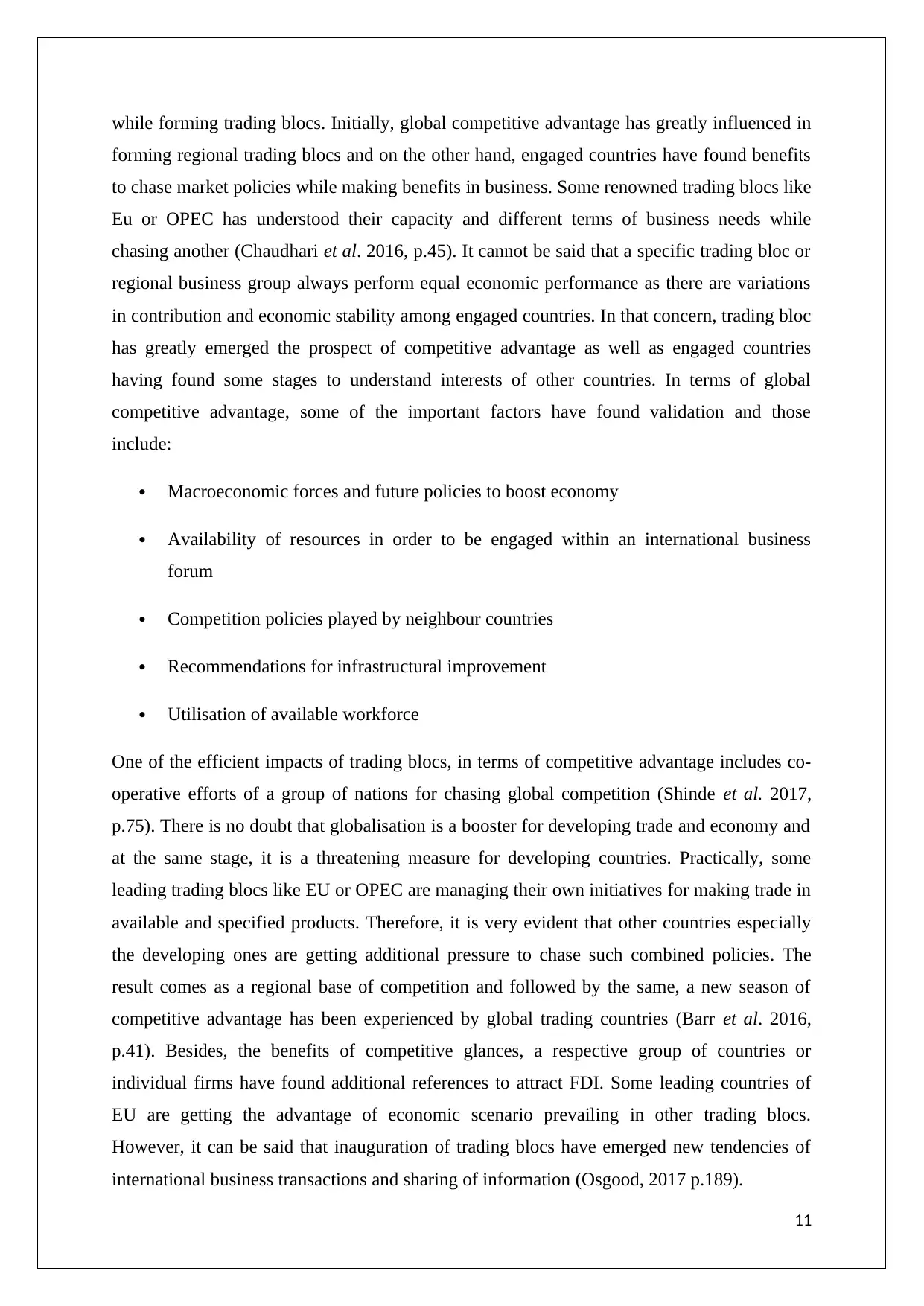
while forming trading blocs. Initially, global competitive advantage has greatly influenced in
forming regional trading blocs and on the other hand, engaged countries have found benefits
to chase market policies while making benefits in business. Some renowned trading blocs like
Eu or OPEC has understood their capacity and different terms of business needs while
chasing another (Chaudhari et al. 2016, p.45). It cannot be said that a specific trading bloc or
regional business group always perform equal economic performance as there are variations
in contribution and economic stability among engaged countries. In that concern, trading bloc
has greatly emerged the prospect of competitive advantage as well as engaged countries
having found some stages to understand interests of other countries. In terms of global
competitive advantage, some of the important factors have found validation and those
include:
Macroeconomic forces and future policies to boost economy
Availability of resources in order to be engaged within an international business
forum
Competition policies played by neighbour countries
Recommendations for infrastructural improvement
Utilisation of available workforce
One of the efficient impacts of trading blocs, in terms of competitive advantage includes co-
operative efforts of a group of nations for chasing global competition (Shinde et al. 2017,
p.75). There is no doubt that globalisation is a booster for developing trade and economy and
at the same stage, it is a threatening measure for developing countries. Practically, some
leading trading blocs like EU or OPEC are managing their own initiatives for making trade in
available and specified products. Therefore, it is very evident that other countries especially
the developing ones are getting additional pressure to chase such combined policies. The
result comes as a regional base of competition and followed by the same, a new season of
competitive advantage has been experienced by global trading countries (Barr et al. 2016,
p.41). Besides, the benefits of competitive glances, a respective group of countries or
individual firms have found additional references to attract FDI. Some leading countries of
EU are getting the advantage of economic scenario prevailing in other trading blocs.
However, it can be said that inauguration of trading blocs have emerged new tendencies of
international business transactions and sharing of information (Osgood, 2017 p.189).
11
forming regional trading blocs and on the other hand, engaged countries have found benefits
to chase market policies while making benefits in business. Some renowned trading blocs like
Eu or OPEC has understood their capacity and different terms of business needs while
chasing another (Chaudhari et al. 2016, p.45). It cannot be said that a specific trading bloc or
regional business group always perform equal economic performance as there are variations
in contribution and economic stability among engaged countries. In that concern, trading bloc
has greatly emerged the prospect of competitive advantage as well as engaged countries
having found some stages to understand interests of other countries. In terms of global
competitive advantage, some of the important factors have found validation and those
include:
Macroeconomic forces and future policies to boost economy
Availability of resources in order to be engaged within an international business
forum
Competition policies played by neighbour countries
Recommendations for infrastructural improvement
Utilisation of available workforce
One of the efficient impacts of trading blocs, in terms of competitive advantage includes co-
operative efforts of a group of nations for chasing global competition (Shinde et al. 2017,
p.75). There is no doubt that globalisation is a booster for developing trade and economy and
at the same stage, it is a threatening measure for developing countries. Practically, some
leading trading blocs like EU or OPEC are managing their own initiatives for making trade in
available and specified products. Therefore, it is very evident that other countries especially
the developing ones are getting additional pressure to chase such combined policies. The
result comes as a regional base of competition and followed by the same, a new season of
competitive advantage has been experienced by global trading countries (Barr et al. 2016,
p.41). Besides, the benefits of competitive glances, a respective group of countries or
individual firms have found additional references to attract FDI. Some leading countries of
EU are getting the advantage of economic scenario prevailing in other trading blocs.
However, it can be said that inauguration of trading blocs have emerged new tendencies of
international business transactions and sharing of information (Osgood, 2017 p.189).
11
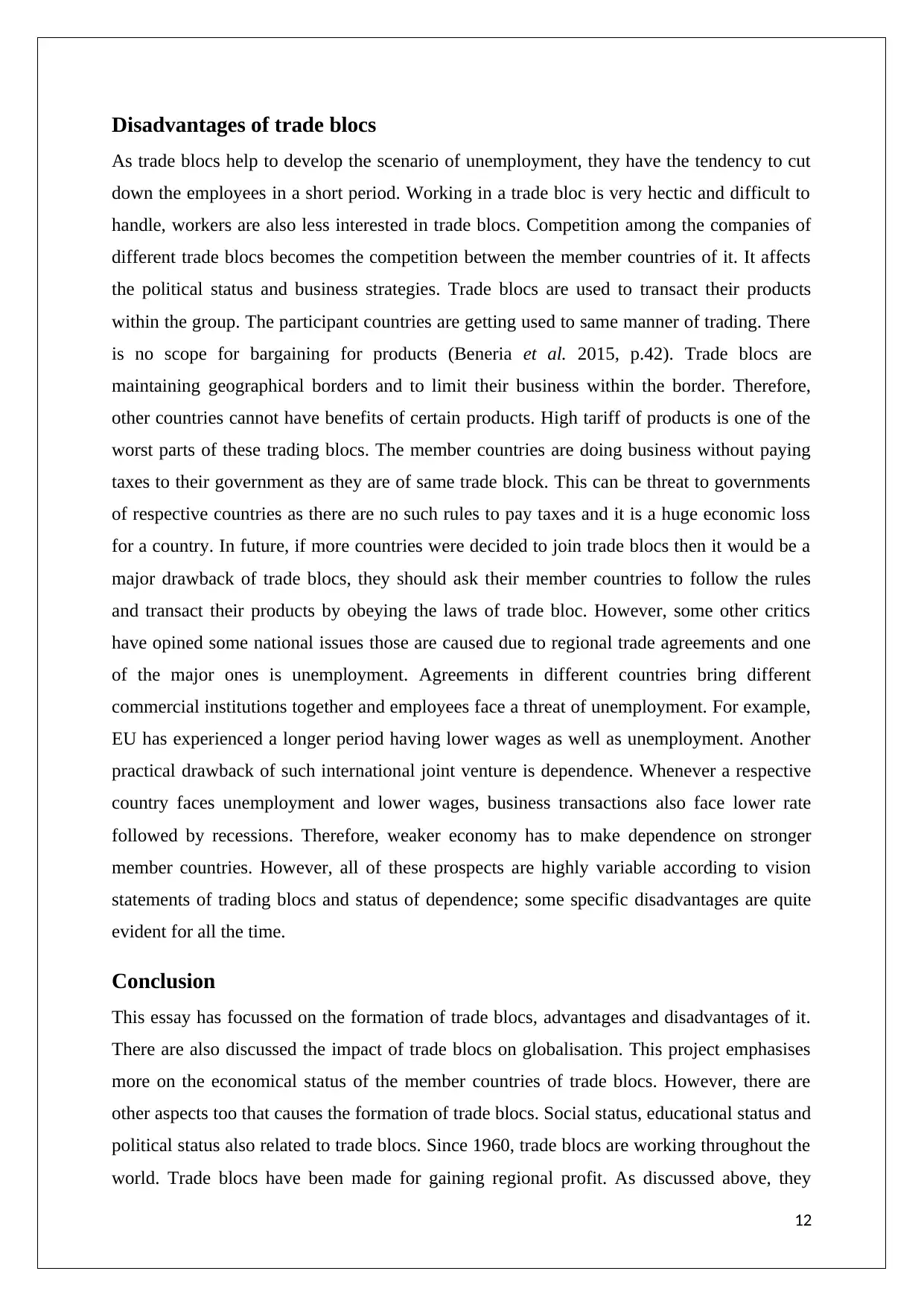
Disadvantages of trade blocs
As trade blocs help to develop the scenario of unemployment, they have the tendency to cut
down the employees in a short period. Working in a trade bloc is very hectic and difficult to
handle, workers are also less interested in trade blocs. Competition among the companies of
different trade blocs becomes the competition between the member countries of it. It affects
the political status and business strategies. Trade blocs are used to transact their products
within the group. The participant countries are getting used to same manner of trading. There
is no scope for bargaining for products (Beneria et al. 2015, p.42). Trade blocs are
maintaining geographical borders and to limit their business within the border. Therefore,
other countries cannot have benefits of certain products. High tariff of products is one of the
worst parts of these trading blocs. The member countries are doing business without paying
taxes to their government as they are of same trade block. This can be threat to governments
of respective countries as there are no such rules to pay taxes and it is a huge economic loss
for a country. In future, if more countries were decided to join trade blocs then it would be a
major drawback of trade blocs, they should ask their member countries to follow the rules
and transact their products by obeying the laws of trade bloc. However, some other critics
have opined some national issues those are caused due to regional trade agreements and one
of the major ones is unemployment. Agreements in different countries bring different
commercial institutions together and employees face a threat of unemployment. For example,
EU has experienced a longer period having lower wages as well as unemployment. Another
practical drawback of such international joint venture is dependence. Whenever a respective
country faces unemployment and lower wages, business transactions also face lower rate
followed by recessions. Therefore, weaker economy has to make dependence on stronger
member countries. However, all of these prospects are highly variable according to vision
statements of trading blocs and status of dependence; some specific disadvantages are quite
evident for all the time.
Conclusion
This essay has focussed on the formation of trade blocs, advantages and disadvantages of it.
There are also discussed the impact of trade blocs on globalisation. This project emphasises
more on the economical status of the member countries of trade blocs. However, there are
other aspects too that causes the formation of trade blocs. Social status, educational status and
political status also related to trade blocs. Since 1960, trade blocs are working throughout the
world. Trade blocs have been made for gaining regional profit. As discussed above, they
12
As trade blocs help to develop the scenario of unemployment, they have the tendency to cut
down the employees in a short period. Working in a trade bloc is very hectic and difficult to
handle, workers are also less interested in trade blocs. Competition among the companies of
different trade blocs becomes the competition between the member countries of it. It affects
the political status and business strategies. Trade blocs are used to transact their products
within the group. The participant countries are getting used to same manner of trading. There
is no scope for bargaining for products (Beneria et al. 2015, p.42). Trade blocs are
maintaining geographical borders and to limit their business within the border. Therefore,
other countries cannot have benefits of certain products. High tariff of products is one of the
worst parts of these trading blocs. The member countries are doing business without paying
taxes to their government as they are of same trade block. This can be threat to governments
of respective countries as there are no such rules to pay taxes and it is a huge economic loss
for a country. In future, if more countries were decided to join trade blocs then it would be a
major drawback of trade blocs, they should ask their member countries to follow the rules
and transact their products by obeying the laws of trade bloc. However, some other critics
have opined some national issues those are caused due to regional trade agreements and one
of the major ones is unemployment. Agreements in different countries bring different
commercial institutions together and employees face a threat of unemployment. For example,
EU has experienced a longer period having lower wages as well as unemployment. Another
practical drawback of such international joint venture is dependence. Whenever a respective
country faces unemployment and lower wages, business transactions also face lower rate
followed by recessions. Therefore, weaker economy has to make dependence on stronger
member countries. However, all of these prospects are highly variable according to vision
statements of trading blocs and status of dependence; some specific disadvantages are quite
evident for all the time.
Conclusion
This essay has focussed on the formation of trade blocs, advantages and disadvantages of it.
There are also discussed the impact of trade blocs on globalisation. This project emphasises
more on the economical status of the member countries of trade blocs. However, there are
other aspects too that causes the formation of trade blocs. Social status, educational status and
political status also related to trade blocs. Since 1960, trade blocs are working throughout the
world. Trade blocs have been made for gaining regional profit. As discussed above, they
12
⊘ This is a preview!⊘
Do you want full access?
Subscribe today to unlock all pages.

Trusted by 1+ million students worldwide
1 out of 15
Related Documents
Your All-in-One AI-Powered Toolkit for Academic Success.
+13062052269
info@desklib.com
Available 24*7 on WhatsApp / Email
![[object Object]](/_next/static/media/star-bottom.7253800d.svg)
Unlock your academic potential
Copyright © 2020–2026 A2Z Services. All Rights Reserved. Developed and managed by ZUCOL.





